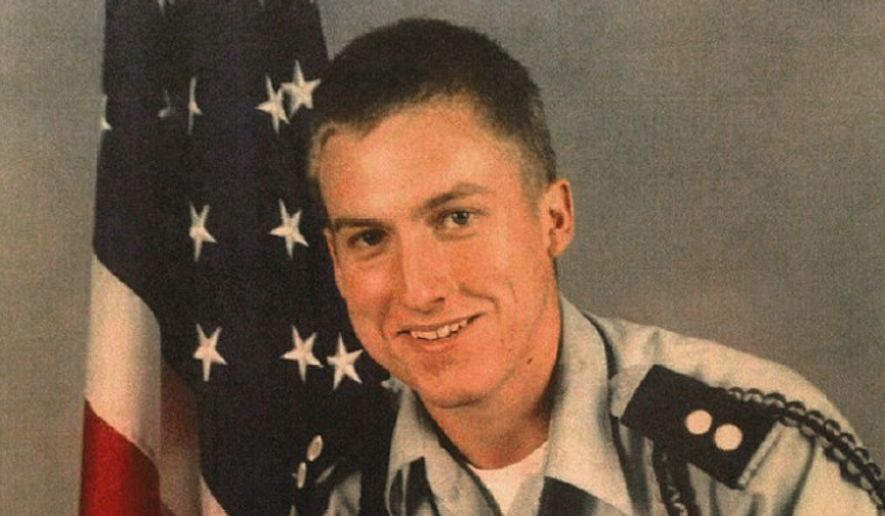The family and lawyers supporting former Navy sailor Kristian Saucier were hoping President Trump would be receptive to the “Hillary Clinton defense.”
Saucier was convicted and imprisoned for keeping never-distributed personal photos of classified sections of an attack submarine on his cellphone. He argued that Mrs. Clinton, while secretary of state, did much worse. She mishandled pages of secret material on her personal computer system and got off scot-free.
“I think it’s very unfair in light of what’s happened with other people,” the president told Fox News’ Sean Hannity in January.
Mr. Trump referred to the Saucier case on the campaign trail as a way of highlighting Mrs. Clinton’s scolding reprieve by FBI Director James B. Comey.
With high hopes, Jeffrey Addicott, Saucier’s pro-bono attorney at the Center for Terrorism Law at St. Mary’s University in San Antonio, filed a clemency request with the Department of Justice’s office of the pardon attorney.
But he did no better with the Trump administration than he probably would have done with a President Hillary Clinton.
The pardon attorney sent out an unsigned rejection letter. It didn’t even go to Mr. Addicott, who had filed the parson request, but to one of the sailor’s previous attorneys.
“In my opinion, the ’deep state’ torpedoed my petitions, and it never got out of the pardon attorney office at all,” Mr. Addicott told The Washington Times.
Conservatives refer to the “deep state” as federal bureaucrats, including Obama administration holdovers, working to sabotage the Trump administration.
“When I finally got a copy of the letter, I concluded it was authentic,” Mr. Addicott said. “This is extremely unprofessional and indicates not only a shocking level of incompetence at the office of the pardon attorney but signals clearly that our hard work received only a pro forma look and never got out of that office to the [Department of Justice] or to President Trump.
“On many occasions, President Trump correctly pointed out the injustice to Kris, and yet he was clearly undercut by a ’deep state’ bureaucracy. Nevertheless, the president certainly has the power to energize the office of the pardon attorney and grant the pardon and the pending clemency petition,” Mr. Addicott said.
A Justice Department spokesperson declined to comment. The Times made an inquiry to the White House that has gone unanswered.
A lawyer knowledgeable about the pardon system told The Times that without intervention “from on high,” Saucier stood little chance because he is still serving his sentence and needs a waiver.
The unsigned May 30 rejection letter said: “Upon careful review of the information you submitted, we have concluded that it would not be appropriate to grant a waiver of the waiting period in Mr. Saucier’s case to permit him to apply for a pardon at this time. Waivers are infrequently granted and then only for particularly compelling reasons.”
Mr. Addicott said the disproportionate felony conviction and prison sentence made Saucier a candidate for a waiver.
“I cited the extraordinary circumstances of how Kris was wrongfully singled out for the heavy punishment by the federal district attorney when other sailors on the same submarine had received a $300 fine and a one grade reduction in rank,” the lawyer said.
As an example of excess prosecution of Saucier, Mr. Addicott said, the Justice Department issued a national press release from public affairs headquarters in Washington for a case that should have been handled by the Navy through nonjudicial punishment.
Mr. Addicott also sent a letter to Attorney General Jeff Sessions asking for an expedited pardon process. An executive assistant wrote back that “unfortunately we are unable to offer expedited processing of any individual petition.”
Mr. Addicott’s request to have the president commute the prison sentence is still pending, but since Saucier is eligible for release in September, he may be out of prison before the commutation review is completed. A federal judge sentenced Saucier to six months of home confinement following release.
Saucier, a machinist mate 1st class, pleaded guilty in U.S. District Court to a charge of unauthorized retention of defense information — six photographs taken of the nuclear propulsion system aboard the USS Alexandria in 2009. A month after Mr. Comey decided Mrs. Clinton’s fate, Saucier was sentenced to a year in prison. A Navy board handed him an other-than-honorable discharge.
Saucier signed a petition saying the Justice Department cracked down on him to show it is tough on those who mishandle secrets amid the Hillary Clinton wrist-slap.
“The reason for the unjust and disproportionate level of investigation and punishment has nothing to do with the appropriate requirements of justice, but is actually directly tied to a national storm of political hypersensitivity precipitated by the misuse of classified information by former Secretary of State Hillary R. Clinton which reached a zenith during the heat of the 2015-2016 presidential election — right at the time that I was being investigated for my misconduct by the FBI and Department of Justice,” he wrote.
Kathleen Saucier, the sailor’s mother, told The Times in January: “I would like to say to Mr. Trump that I believe that he’s our hope to re-evaluate the way things are done in our government and that we, as American patriots, should never have to be in the position that myself and my family and I am sure many others have been.”
• Rowan Scarborough can be reached at rscarborough@washingtontimes.com.




Please read our comment policy before commenting.